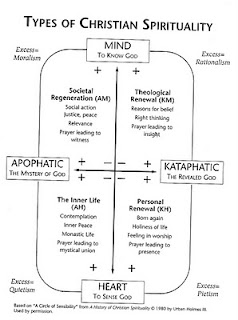Golden Compass...

I've never been that convinced that conditioning young impressionable minds to believe out of fear of the fire and brimstone of a medieval eschatology is the way to encourage our children to be part of God's plan of putting the world to rights...
I went with a couple of good friends to see the infamous Golden Compass; my inbox still full of warnings from well intentioned people suggesting that it would be a route to atheism. The problem of course being that these people - no doubt never having been to see the film or read the books - fit the bill of Church that quite obviously so appalled Pullman when he wrote his clever allegory. A Church that dictates faith constructs through fear and entrenchment.The allegory was there to be seen - the abuse of education of children by the church. I've never been convinced that telling our kids 'that they really ought to be friends with Jesus because if they don't they'll go to hell' is the way to introduce them to the beauty of kingdom living. I've never been that convinced that telling our kids 'that if they live by the rules they will have an eternity with God and that they should remember always to say sorry to God just in case they get run over' - is the way to introduce them to what it is to be truly at peace with themselves and with God. I've never been that convinced that conditioning young impressionable minds to believe out of fear of the fire and brimstone of a medieval eschatology is the way to encourage our children to be part of God's plan of putting the world to rights; or to show our children what it is to be fully human; or to show what it is to challenge inequity, to stand for those that have no-one, to love in Jesus' way - but we all know that it happens.
It's a shame that the church through history has given so much material to feed Pullman's allegory.
The dogmatic dictatorship called the Magisterium threatens to dominate the world through refusing thoughts of potential; refusing questioning minds that enquire or think of what could be; conditioning thoughts and opinions to what can be managed. I watched the film wondering how Philip Pullman and Richard Dawkins might teach their children; grand children about faith; how restrained they might be to allow engagement with a narrative that they might find repulsive; how open they might be to openly teach about questions of belief and God.
I watched the film enthralled, intrigued totally oblivious to the drama that was unfolding behind me - two people walked out eventually after much apparent muttering and exasperation - the final straw? A reference to the impending 'battle for freewill' - I guess they couldn't see Pullman's criticism as something that should challenge the church to think deeply at how it is perceived; I guess that they couldn't see fundamentalist atheism is just as bad!

Comments
You're right, fear never encourages trust, peace, attraction or love towards God. It can produce guilt, anguish, and deep anger and terrible anxiety, but not love.
The allegory of Pullman's work is plain to be found, walking a tightrope of disclosure and opinion, but it is only plain when seen by a mature spiritual person. I feel firm that his writings are not intended for children, even though they are placed within the juvenile literature section within the library. Someone who is seeking with spiritual questions, young or old, can easily be caught within a net of further unanswered questions by his writings. Allegory has that type of effect, a medium which communicates clearly, yet not directly. I consider his writings were more intuned to the corruption and abuses of the Church, rather than an attack on belief in God. His writings are more critical of wayward believers, and their warped judgements, actions and intentions.
I prefer a book to a movie any day, and his writings are definitely page turners and note writers. I read them first a decade ago and again in 2005. Did you find the movie a comparable storytelling experience to the book?
I look forward to reading your posts.
Have a look at my post about the Golden Compass; however I’ve mainly written about the quality of the film. http://reverendmavis.blogspot.com/2008/01/golden-compass-verdict.html
I agree with you that if people look back at church history they can see a direct link with what Pullman is suggesting. However, as society (in the wider sense) has learnt lessons from the past, so has the Church. As a children's worker I see the great importance of telling kids about Jesus and what He means to me, and what He can mean to them. However, it would be overtly unethical to bully or blackmail kids into faith. I like to think of myself as a story teller, telling what I believe as the greatest story ever told.
In my role at the corps there is really one main expectation with evangelism amongst children, and that is to build relationships. Nothing more. With these relationships it gives opportunity to share my story which also part of God's story.
And that is why I think I've got the best job in the world. :)